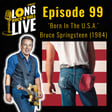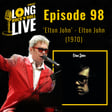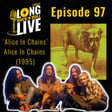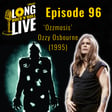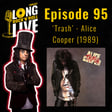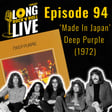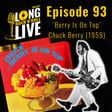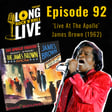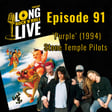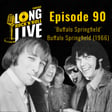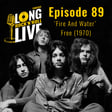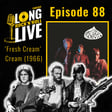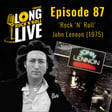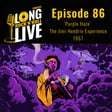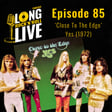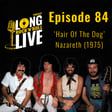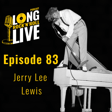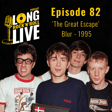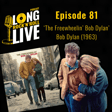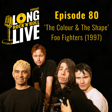Oasis' Transition and 90s Britain
00:00:12
Speaker
Hello and welcome back to the Long Live Rock and Roll Podcast. In 1995 Oasis departed from the raw energy of Definitely Maybe in favour of a much richer and complex sound. What's the story Morning Glory was significant not just for its commercial success but for its role in defining a cultural and musical movement, perfectly capturing the spirit of Britain in the 90s.
Introduction of Co-host and Album Discussion
00:00:36
Speaker
Its innovative approach to production, its impact on the Britpop scene and its anthemic choruses all contributed to it becoming one of the most famous and best-selling albums of all time. Joining me to discuss this album is my co-host, Mr Felipe Amarin. How are you doing,
Humorous Tangent: First World Countryside Problems
00:00:50
Speaker
bro? Doing great, man. How are you doing? Yeah, not bad. Thank you. Do you want to hear about First World countryside problems? Yeah, tell me. It's really hot here today. The sun's out. but I can't open the window because the farmers have spread shit on the fields. See?
00:01:04
Speaker
And it stinks. The house stinks. It's like a three-day thing. They should they didn't want us. The farmers didn't want us. No, they just spread their shit how they liked it on the on the field behind our house. It's going to be ah two or three days of it like this, but yeah, it is awful. And I'm hot and I'm sweating and I can't open the window because it stinks of shit.
00:01:23
Speaker
Yeah. hashtag Hashtag first world countryside problems. Yeah, there you go. that so can you specifically that's what i do yeah actually you you did it right there if you pay i good it you know it's ah it's It's not too hard for my South American standards, so it's all good. Has the Oasis buzz been going around London? Because recently in the news, we've learned that Oasis have a reuniting, aren't they, for a special tour in the middle of next year. So has has has that been the talk of the town in Soho?
00:01:53
Speaker
Yeah, a lot of people have been talking about it. I think everyone is talking about it, even people who don't like them. Because I think that's a really interesting thing about Oasis is everyone talks about them even when they don't like them. And actually, do you know what? I should start the disclaimer of the show because I don't want people thinking I'm in a bad mood today.
00:02:12
Speaker
I really can't stand Oasis and I really don't like this album and I can't stand the Gallagher brothers. However, that doesn't mean I can't be impartial and sort of adequately talk about its place in history. But just in case people think, oh, Laz is having a bad day today. He's not saying very much. He's having a bad day for many reasons, including talking about Oasis. Countryside problems, Oasis, you know. So actually Felipe is going to do the monologue at the end of this episode because I kind of thought it'd be a bit disingenuous if I did it. He refused to do it.
00:02:41
Speaker
oh Hold on, yeah, I pre-read all that. I just thought it wouldn't be very true if I sort of was spouting all this good stuff. But in all joking aside, I will be unbiased. I will be impartial because this album is incredibly important and it's incredibly significant to British music, rock music and Britain in the 90s, I think. So I'll kick off as usual with a bit of info about the album. So the album was released on the 2nd of October 1995, recorded between May and June 1995. We're going to touch on this, but apparently it was only a two week recording session.
00:03:11
Speaker
ah The studio was the Rockfield studio in Wales. The genre classed as Britpop with a secondary genre being out and out rock. The length of the album is about 15 minutes long. The label was creation and the producers was Owen Morris and Noel Gallagher himself.
00:03:27
Speaker
So I just want to do a bit of background about music in the 90s before we sort of go on to talk about the album itself. So this is a really significant time in the 90s because Britpop is kind of growing. it's it People think Britpop was at its peak between 94 and 97. So 95 is sort of banging in the right place for Britpop to be at its peak. However,
00:03:48
Speaker
It was still a rising genre because we had a resurgence of guitar-based music. If you think about the 80s, so much keyboards, so many synthesized electronic sounds, keytars, keyboards, organs, synthesizers, that actually at the beginning of the 90s, guitar-based music was being researched. And obviously, Britpop was a massive part of that, taking back the raw, energetic rock of the 60s and 70s.
00:04:14
Speaker
um The other key thing about the about Britpop, which actually is only recently I learned about it, is in essence, it had its own little jewel with grunge in America, which I wasn't aware of, you know, so they they kind of saw grunge at the beginning of the 90s. You know, I'm imagining the people in Britain will i hold on. They've got really good music over there in America.
00:04:35
Speaker
when When did they give up all the synthesizers and crappy electronic music of the 80s? When did they get guitar music back? You've got the likes of Nirvana, Soundgarden, Pearl Jam, all really doing the grungy stuff in America. And it's all guitar based. All guitar based, all emotional lyrics, all introspective, heartfelt lyrics instead of the cheesy 80s stuff we had before. And I think Britpop was a generational cultural answer to America's grunge.
00:05:04
Speaker
Now Britpop is way more upbeat and happy than grunge. It's way more melodic. I feel like it has way more of a character and a pop-ness to it, um but still they were they were sort of fighting each other, you know, in terms of grunge in America, Britpop in England. So what do you think is the um it' the one particular element that makes Britpop properly British ah as as opposed to grunge, which is ah essentially American. What do you think it is? Because I have an opinion on that. You've gone. I want to hear your opinion. I think it's the humor, isn't it? There's a touch of humor, as I said, like the grunge is very serious. Yeah, it's like, you know, like my dad hates me, life is crap. Yeah. I want to sing about this. I want to cry. I want to kill myself. Some people of italy did that, which is really sad anyway. But what I'm saying is um the the the Britpop stuff is like, yeah, here we are, you know. um
00:06:02
Speaker
bringing the guitars back to to to to pop music and we're going to be as loud as the grand guys but maybe we're not that miserable, maybe we're just going to make a little bit of a joke out of all this. That's what I think. That's a great point and and I think later when we get to the, you you've got stuff to say about the lyrics and themes of the album, right? Yeah.
00:06:25
Speaker
We'll do it later, then, because I want to touch on something they call all Britannia. So we'll come to that later. But I explained a little bit about what we said. But um yeah, I think things are in a really good place in Britain. And that's what we'll come on to later. The world was the world. Britain was a bit carefree in those times. Things were going really well. So I think people actually had the opportunity to sit back and say, look how cool life is in in America. I'm not sure financially, politically what was going on in the 90s, the early 90s in America.
00:06:53
Speaker
But you do wonder if the product of grunge if the result of grunge was a product at its time. um And I think music and politics, as though although we try not to sort of mar them on this show and give political opinions, undoubtedly they always hand in hand because the politics of the time will often be reflected in the music. That may not necessarily be pop music, the music that's being played on the radio every day, but in underground scenes like heavy metal and grunge you will see the politics come out. So in Britain things were good, things were really happy, everyone was sort of living a good life and as you said this Britpop movement kind of just put a bit of humour into it and said come on let's let's take a look at the the funny side of Britain.
00:07:30
Speaker
Yeah, exactly. yeah You can definitely hear that um hearing that and in the lyrics and and and the over approach of Britpop. And and um although there's this like a refutation of people in the UK to be really sad or or a little bit miserable or complain about stuff, um you can see a lot of happiness in in the 90s and can see a lot of... Prosperity. Yeah, prosperity. And that's reflected on the music for sure. Yeah, I agree.
00:08:00
Speaker
Well, let's talk about the music. So going into that, you know, this album. Oh, I got we got four different topics we're going to talk about the recording and production, the sound of the album, the influences and the releases. I think we should go for the releases first, because when I look at a perfect way to release singles of an album, I look at this. Yeah. The album was released when did we say October? Yeah. Second of October, 95, 24th of April, they released some might say. Yeah. 14th of August, they released Roll With It.
00:08:30
Speaker
18th of September they released Morning Glory. 30th of October, so the album's now out, they released Wonderwall. 19th of February, 96, they did Don't Look Back in Anger. And 13th of May, 96, Champagne supernote Supernova. So one year, almost, let's call it 11 months, 11 months with a single like sort of every two months.
00:08:51
Speaker
That's how you market an album. And that undoubtedly has led to how the success of this album in terms of sales, because it seems to me you couldn't get away from it. All these singles, and they you started to enjoy Oasis' new single, some might say. Three months later, they got another one out. Roll with it.
00:09:08
Speaker
Yeah, also you have to have the same kind of um ah you have they have to have some sort of quality control for that, right? yeah If you pick the wrong songs, although the album's got a lot of good good songs, well-written songs and potential hits, if you don't pick the right ones and release them in the best order, you might not make the best out of out of the album. And I think ah whoever was in charge of it in the label,
00:09:32
Speaker
they definitely got this one right. They did didn't they because the three biggest songs that I mean I think it's arguable but I think you'd agree with me Wonderwall, Don't Look Back in Anger and Champagne Supernova are the three titans from this album right? Yeah. Because although you've got songs like Some Might Say Roll With It, She's Electric, that are still famous, those three I mean you and me know from how many wedding and pub gigs we've played Oh yeah. You will always finish the gig with Wonderwall, and if not, then don't look back it i back in anger. You've got to play those songs. And Champagne Supernova is almost always in the DJ set after the wedding. So these three, they're the titans of these songs and they are literally timeless songs because they are still being played.
00:10:11
Speaker
why we now 30 years later so it's really yeah really impressive but and then and then to have those three come out after the album's been released it's just a little trick of genius isn't it because you're kind of teasing people in with some might say roll with it morning glory and then when the album's released and people realize oh wonder was a banger oh don't go back in anger is really good releasing the singles put something different on get a new video in get a new look to the songs and then you're going to get them played and bought infinitely more yeah Very impressive, isn't it? Marketing scheme.
00:10:42
Speaker
Yes, it is. um and anything yeah he eat but yeah what something about One thing about, are we talking about the recording? And are you in charge of the subject? No, let's do it. Let's go to yeah so yeah yeah the other recording. So the interesting thing about the recording is, Noel Gardner claims that they actually recorded in 12 days. So if say it's about two weeks, as you said, you have to consider that it takes, um you know, maybe a whole day to get the drum sound right. And it takes maybe another whole day to, you know,
00:11:11
Speaker
check the microphones and the amps and and and try the guitar tones and stuff like that. you know it It takes ages to do those things, but he claimed that they've recorded one song per day.
00:11:23
Speaker
which is really remarkable in terms of like doing all the instruments of ah of a song in one day, yeah especially considering that he said half of the songs were not even written by the time they go into the studio. So that is... Wow. I mean, that's that's the key to some good songwriting, isn't it? That's the yeah so definitely that's a sign of good songwriting showing that you know you can come with a song that's not even fully finished.
00:11:46
Speaker
get it recorded in one day, but also finish the structure of the arrangement. And you know what that well that means to me? ah Maybe when you do that, you you don't have time to overthink the arrangements. And I think the the way they play it, I don't know if you have this opinion on their music. It's like, you know, when someone shows you a song, I've just written the song, they play the acoustic guitar and they sing on top of it, and that's it. Always, it sounds like it's just one step after that.
00:12:09
Speaker
they just plug that guitar, they just do it with an electric guitar and put a drum and bass beat to it and just get to the end of the song and that's it. yeah ah That's a very simplistic way of defining what they do with arrangements, but essentially it's what they do. Wonderwall is a specific case where they have some strings, I think they have a cello, that there's some stuff going on but that's some clever ideas in there, but they're very, very subtle.
00:12:35
Speaker
But that stuff can be done afterwards or getting an orchestra in the studio. In terms of what you're talking about, I read the saying that they did this in two weeks because they spent no time overthinking, second guessing, questioning what they did. They just went with their ideas, probably finished it off in the same way as well. You know, just thinking, oh, let's not overthink this ending. Let's just get it done so we can end the song and move on to the next one.
00:12:56
Speaker
I also read that the environment in Rockfield Studios, now Led Zeppelin have recorded, no Led Zeppelin, Queen, not Black Sabbath, they all recorded there and this is a Rockfield Studios in Wales. The rural countryside apparently lent it to Oasis in being a very casual laid back recording session.
00:13:17
Speaker
yeah Apparently, things were very sweet, that sweet as in, you know, a sweet man, you know, is it like a really cool laid back environment where they were able to immerse themselves in the album. And we know from experience, you and me, that this works. When you're doing a recording session in London, it's horrible.
00:13:37
Speaker
And because you're listening, you're on the bus or the tube, you're going to the gig, you're sort of getting squashed by people, you can't sit down on the tube, you've got your hit headphones in listening to the demo, trying to, you know, and what's the was it called? Ghost play, you know, trying to remember your part. And then you've got to think, where's my stop? You know, am I getting off here? Then you've got to use City Mapper to walk to the studio.
00:13:55
Speaker
whereas when we And there's always a diversion on the back. Yeah, that's all I see. It's never straightforward. Or the train gets stuck. Exactly. But you and me know, we went and recorded an album in Devon in the countryside and we rented a house out and it was fantastic because we just went there. It was five minutes from the studio. We came back each night.
00:14:12
Speaker
And we just sort of relaxed, ordered a bit of takeaway, knew that we needed to be in the studio 10am the next day, had this lovely, it was like a ah forest, wasn't it? Woods behind us. And it was just lovely. you You take your head out of the everyday life and you put it into the album. And because of that, you get exquisite performances, you get dedication. Not that you don't dedicate a performance in London, but your mind is elsewhere, isn't it? Exactly. I think you get committed playing.
00:14:37
Speaker
Yeah, on top of that, you've got to consider they already had one big album, you know, they they did really well with the first album. And so you've got the money, you've got the time, you've got the energy, the creativity. And you don't have, you know, a lot of people fiddling on their phones like people do. Right. So I think about it. So it definitely maybe was recorded in Manchester studios in Manchester, Manchester, Wales, Cornwall, Liverpool and London. Yeah.
00:15:05
Speaker
it's no surprise that with the second album they wanted to be like let's just choose one place and settle down for the two weeks and get the album done and they were probably touring at the time maybe ah maybe that's the reason for the tight schedule yeah it have yeah um but the yeah so just about the recording and then to add to that they apparently i read that they did a lot of live takes with minimal overdubs and I think you can hear that in the album it sounds like a rock and roll band it does yeah it sounds like a garage band as as we normally say because like oh that that's an expression that probably comes from America where most bands actually actually rehearse in garage yeah and um
00:15:43
Speaker
But I love that kind of vibe. A bunch of people playing together. Sometimes they are at different levels musically, but they can play together and sound good as a band. And when we're going to put an album together, that's what matters. It's not like the individual talent or whatever. It's just sound good as a group. And I think ah they do sound good as a group in this album. And as I said, it sounds like a band, you know, guitar based drums, vocals. is very straightforward in that sense. I think that's that's the rock and rolliness of the album, is the fact that it's it's playable by anyone pretty much. If you have two guitars, bass and drums, and you start a band, you can play any song from this album straight away without missing any essential elements of the song.
00:16:25
Speaker
One thing that is at the forefront of the album is definitely the guitars and the vocals, isn't it? And this is what we call the wall of sound, where it's a sort of production technique where you focus very heavily on some defining features. And in this case, it's obviously the guitar and the vocals. They are first and foremost the front of the album, the guitar riff and the vocals are what matters most.
00:16:45
Speaker
yeah Yeah, exactly. And it gives that punchy energetic feel, doesn't it? Exactly. And one thing that happens with them is like, ah you probably, um when you hear like distorted guitars, what you normally have is a power chord, which has two or three notes. Am I right? Yeah. or is it yeah So when you play, still remember playing power chords on guitar, but um what they do a lot is like the whole chord. That's what I said, like it's like playing acoustic guitar, but with distortion. yeah That's what it is. So they normally play the whole chord, not only the the simplified power chord, which is common in rock music, and it it makes it sound a bit, ah maybe it sounds a bit messy sometimes, but that's that's part of it. It's what ACDC does.
00:17:31
Speaker
Yeah, in a completely completely different style. but Well, it's it's a characteristic, it's a personality of the album, isn't it? Yeah. um Well, let's talk about the sound of the album then in terms of like the the songs and everything. So definitely, definitely maybe was so much more raw, punky, energetic. We move over here and we've got a much more polished um production melodic sound to the album, haven't we? You know, I think of Wonderwall, and I'm not going to go on about what I don't like about this album, but I can't stand this song. Every time we used to play it at a functions, I had to sit there, sit my way through. It was the last song of the night. I'd be like, I can't fucking wait to go home. Like, oh, now I've got to do this. But the strings on Wonderwall are fantastic. They really give me kind of Elinor Rigby vibes, just with how it's almost like. If you took the strings out, it would be a different song.
00:18:24
Speaker
yeah can Can I say something about the arrangement in this song? The strings they start... on the second verse, right? So there's a whole verse was just, a that I love when you you add layers one by one and it's it's a simple production, um um I'd say idea that works really well in pretty much any songs. So you start with just guitar, actually just guitar and then the vocals. And then the whole band comes in. when When the second verse starts, you would expect the drum beats to be there right away.
00:18:57
Speaker
and the strings start and the there's a drum fill and the beat starts on the second line of the second verse. yeah So it's like the drummer is one bar late intentionally. yeah he hass the second yeah it's just like worry eight since yeah um yeah It's like tension,
00:19:13
Speaker
not musical tension where the two notes don't match but you're like hold on. something's missing, but but like you're still vibing with the verse and suddenly the drums come back in and you're like, yes, that's exactly. It's actually super clever. That one is again, it's those subtleties, they make an album sometimes. Yeah. So I'm pretty sure if I listen to this album and in 10 years, I'm going to find some other element like that. and think yeah I didn't notice that, you know, I think if I had to sum up the album, it would be catchy hooks, memorable melodies and anthemic choruses. Yeah.
00:19:46
Speaker
when you think of the intro of She's Electric, that guitar, the diddle, the diddle, the diddle, the diddle, the diddle, you know, it's kind of, you just sat there, it's a bit, you're not sure where it's going until suddenly it drops into the verse. ah Memorable melodies, again, the verses, choruses, everything, the melodies are very simplistic. um And then the anthemic choruses, I mean, is there a more anthemic chorus? And this is where I get to say the part I wanna say, despite everything I said, and despite my thoughts on Oasis, the album and the brothers,
00:20:16
Speaker
My statement is, Don't Look Back in Anger is one of the greatest songs ever written by a British band ever. Beatles included anyone. And it's not a matter of like, yeah. It is stunning, man. It is a stunning song. And I think the whole reason I went onto this is because of anthemic choruses. I i can't think of a more anthemic chorus. People will say, you know, Mr. Brightside or i a Sweet Home Alabama. But I think in terms of passion, emotion,
00:20:44
Speaker
and feel that you can hear them sing into that chorus. It doesn't get much better than that song. Yeah, I think the interesting thing about that song is um they wrote the song, I think, without having all the lyrics and just jamming, playing at sound checks. I think Noyo mentioned something about, I think as his kid or some kid ah said, or what you sing in there, it was just like mumbling the lyrics, like making it up, or there was no actual lyrics. I said, are you saying ah um
00:21:15
Speaker
So Sally can't wait. And so Sally can wait. yeah so that He wasn't saying that, he was saying something else. I said, we go that's what I'm going to say from now on. And it's those little touches that make a song special. yeah but But essentially what he said it said is the song is about not regretting whatever you did wrong in the past. And that's what it is. Wonderwall is for his his wife, but it was she was as his girlfriend at the time.
00:21:42
Speaker
and is about I think she was having a hard time and he was ah he was like no no you need to be there for me you need to be strong so because I'm i'm always like ah in pieces all the time so basically he was saying like ah you know don't worry about whatever happened and and and because ah because I needed to be there for me as well, whatever. So it's, it's it's it's is again, it's ah real life stuff, right? That's why I like i like those songs because they all they know, um although they might have a pretentious attitude sometimes, the songwriting doesn't necessarily reflect that every time. yeah I think some of the songs are just like, this is me talking about my life and I think everyone can relate to it. Yeah, that's a good point.
00:22:28
Speaker
um In terms of instrumentation used, the reason I disagree... No, I don't disagree. The reason that I'd say it's more than just rock is because we get a lot more. We get lots of acoustic guitar and piano throughout the album and not ah individual little spots through most of the songs.
00:22:48
Speaker
Some songs, you know, Aces, especially this album, they have this formula where they get a verse, let's say they're playing like 70% intensity for the verse. They'll then bring it down to 50% for the pre-chorus, like Bill, you know, I'm going back to Don't Look Back in anger. So I start a revolution from my bed. And then when the time for the chorus comes in, they whack it up to like 90% intensity. They throw in lots of stuff like piano, acoustic guitars, even some more orchestral stuff as well.
00:23:14
Speaker
And I think that's a really, a really cool aspect of it because it does take it to the next step further than rock. Yeah, one thing you have in that music is there was a lot of percussion, a lot of tambourines and shakers and that stuff. And that, for me, that comes from from the Beatles. The Beatles had a lot of that. I'm glad you made that segue. um Let's talk about the influences. Yeah. First of all, and first of all is there anything any other songs you wanted to talk about or any other? I just i just sort of say there's one song that is my particular but favorite song in the album, She's Electric, because i love I love this song that kind of breaks the mood of the album, is in the middle of the album, has got nothing to do with the rest of it, in my opinion. It's got like that shuffle vibe, sounds a little bit like Beatles to me, and the lyrics are just like funny, and I like it. She's Electric is a great song, in my opinion. It's is' nice i would is's not underrated, it's a well-known song for
00:24:06
Speaker
anyone who's an Oasis fan. So, but he it's, a yeah, it's for me, it's as good as as the, the, the, the- Main three. Yeah. Yeah. Influences. So I think you might've answered the question I was going to ask you, but out of the four big pop bands of the sixties, The Beatles, The Stones, The Kinks and The Who, who would you liken Oasis to the most and why? I'd say Beatles and Stones, but ah there's a little bit of T-Rex as well. Yeah. Yeah. Good, good point. um Well, why? Because a lot of people the riffs give give a criticism of Oasis. Oh, they're just they're just copying the Beatles. I see the argument for that. And even though I have this, even though I have the the reason ah to make that argument, I don't i don't agree with it.
00:24:54
Speaker
No, I don't think it's just like copy and paste, because if you say that, right, to say that they're copying someone. So tell me exactly which song was, you know, was I'm going to answer you. Yeah. So like this song sounds like the bits of which song. Exactly. The only I will point to something like the Beatles. Then it's an influence. Right. You know, the end of She's Electric. Yeah. Does this sound like the end of a little help for my friends?
00:25:21
Speaker
Yeah. Yeah. I'm joking. As in that's the only time. That's fine. But that's not that's not that essential to the song, isn't it? No, exactly. and It's the end. in And so I just um just note for listeners and viewers, any song we mention is going to be down in the show notes in a dedicated playlist so you can listen either before the show or after the show or with
Influences of The Beatles on Oasis
00:25:41
Speaker
us. You've got the full album in there plus any little song we mention. So please carry on. And specifically, that's a show for beat, like with a little help from my friends. Yeah. Same sort of groove. Yeah.
00:25:52
Speaker
Um, excellent sound. I think, uh, yes. So the influences, I mean, the Beatles stuff. A lot of people make the comparison. I think it's fair. And I heard in this album quite a lot of stuff, the chord progressions. Now, when we think of pop music now.
00:26:06
Speaker
And being very generalizing, you think of four chords. You think of chord one, chord four, chord five, maybe chord six. Getting a little bit musical theory here. These are the chords that bands like The Beatles, especially in their early days, made up and made so familiar. you know And there's a song called, if you can find it on YouTube, it's called The Four Chords Song. A minor, G, C, and D minor, or D major.
00:26:31
Speaker
and it shows how many songs have been written with these four chords as there's the root of the song but here I hear lots of different stuff like in the song Hey Now when he sings the line No Time for Running Away Now the song just takes a little turn it's one chord but it just takes a turn that makes you go oh that that's not what I was expecting and the Beatles do that a lot and I thought that's what I heard in here Descending bass lines, I think they're doing Don't Look Back in Anger, so it's like, you know, do, do, do, do, do. And they base chords around that. Which works as a preparation for a chorus sometimes. or Works all over the place. The Beatles did it, they used it. James Taylor uses it a lot, singer-songwriters, they love that. um The other thing, simplistic melodies and solos. There's not one solo on this album I heard where you think, ah, he's trying to be flashy here. It's always delivering for the song.
00:27:21
Speaker
Yeah. And the solo is normally like a composition as well. It's just not like playing random notes. that not and that's what I heard that I could tie to the Beatles. With the Stones, I didn't hear that much. Maybe the energy, the attitude, the the rock and rollness. But the the intro to some might say it's got a little bluesy touch, isn't it? Yeah. Which I hear of the Stones. The Who, I think this is where the attitude and energy comes in because you've got the distorted guitars, the heavy drums.
00:27:47
Speaker
the kind of hard rock aspects of it, the rock and roll lifestyle, the head banging, I imagine. And the Kinks ah brothers, that's the comparison I found, you know, the Kinks, Ray and John Davies, I think, were brothers. like They didn't have a good relationship as far as i'm as far as I'm aware, and the same as Oasis. So I think it's cool that, with you know, It's fair, as a non, as as ah let's call me a hater of Oasis, I think it's so easy for me to come in and say, oh, the beat yeah, they're just copying the Beatles. But actually, when you think about it, they really have taken certain aspects from each of these bands, whether it's the attitude of the Who and the Stones, the the the musical influences from the Kinks and the Beatles. it's it's You can only admit that they have made their own brand of music. And although it might sound a little bit like the Beatles in places, it's still original.
00:28:36
Speaker
if we had Noah Gallagher in the show what would you say to him? I feel like my integrity would that I would be more than happy to say no I don't like the music and I don't like the album but I'm really you know but I respect you because how can you so you do it you did it really well how yeah how can you not respect it man like you know this is where I feel like our show I don't want to say it stands out because I don't want to say that no one else does this, but look at what we're doing. we're We're doing an album. I chose the album because I know how important it is. Yeah, actually, I listened to the album a few years ago and I was like, no, I don't really like it. I listened to it in depth this week and I actually i hate it.
00:29:14
Speaker
but But I'm still here giving an impartial, unbiased opinion on it. you know um And I think that you know this is what we've got to do. you know if If people come and listen to us as ex-musicians, as pro-musicians, um for an opinion on just two regular guys who tour the world, we play music, we love music,
00:29:37
Speaker
We've got to be honest, but at the same time, you've got to give credit where it's due. There's plenty of albums by big bands that I don't like that we will do on this show, but I can't take it away from the man it what does it has a difference between them, There's a difference between your tasting music and what you believe it's is good and remarkable or or important.
00:29:55
Speaker
Yeah, I agree. And that's what it is. Go on. Yeah, one thing I want to say about the album cover, you know the building at the end? Oh, go on. Yeah, go on. For those watching, wait, can you see my mouse on the screen or not? No, I can't see it. So I'm going to use my finger. This one, isn't it? This building. Yeah, for viewers on YouTube, watch that building and that window. Go on, Felipe, tell them. I lived in that room on the top for two years. That one. Yes, he did. And I visited you several times. It's probably the most rock and roll thing about my life is that I lived in a rock album's cover. Not that you're one of the most sought after blues drummers in Soho or that you're gigging literally seven nights a week. No, I lived in an album cover. That's super cool. A couple of things about this. One day I'm going to superimpose your face on that and I'll give you a vinyl. I'll be like, hey, Felipe, there you go. You won't notice until you look one day and you're like, oh, Laz has stuck a picture of my face in it.
00:30:52
Speaker
Yeah, go check check this out. There's an interesting thing about this. So that's Berwick Street in Soho. And um you you might wonder why people from Manchester would do an album cover in in London. ah Basically, I think they used to go then shop but you know cds by cd or not so CDs, vinyls, like proper records. So ah the role is famous for the the the record shops and and And I think that was that was the reason why they decided to the album there. You have a man in the background, apart from the two guys in the front who are not the Gallagher brothers, by the way, on that side. That man, he's covering his face with something. Can you see that? So that man is the producer of the album. And that thing is the master tape of the album. No way. Yeah, the object he's using to cover his face is the master tape of the album. Nice touch. Is this Nolan Liam? No, no, that's a DJ and a designer. They have nothing to do with
00:31:53
Speaker
Uh, with the band, I guess, or, or I think they are maybe the designer work in the album. I don't know, but they know them. Yeah. Thank you for, thanks for pointing that out. Yeah, that's cool stuff. So their headline Felipe lived in the album cover of what's the story morning glory. exactly That's my claim to fame. Let's move on to the, ah do you have anything anything else to say about the music? No, no. No, so let's move on to the themes and the lyrics of the album. I know you always touch on lyrics. Before you do, though, before you talk about some certain lyrics to the album, I want to shape what I was talking about about Britain in the 90s.
Cool Britannia and 90s Cultural Pride
00:32:21
Speaker
This is an era we called Cool Britannia because Britain was in a great place. Now I'll just start explain some points. This is post Thatcher. Thatcher was in power for was it 12 or 13 years? um And it ended in the early 90s. Britain had a desire for something new.
00:32:39
Speaker
It had become very stale under Thatcher through the 80s that when new Labour and Tony Blair came into power, for good or for bad, whatever side of the fence you sit on, it was new and it brought a hope to Britain that actually so our country can be a bit different. There was a renewed sense of national pride, cultural confidence and essentially economic optimism around the around Britain. People were happy.
00:33:02
Speaker
And Britain became proud of itself and what it had to offer the world. And in the arts department, it flourished everywhere. In music, you had the Brit pop that was a nostalgic nod back to the 60s. It wasn't like, oh, let's try this new electronic stuff of the 80s. Let's do what we're good at and take it back to what it was like in the 60s. In fashion, you had the likes of Alexander McQueen, Stella McCartney, Vivian Westwood doing their thing.
00:33:28
Speaker
in art, you had Damien Hurst and Tracy Emin, in movies you had Danny Boyle and Guy Ritchie, you know movies like Lock Stock, Two Smoking Barrels that were quintessentially so British um and just as well as that a general sense of celebrating Britishness through celebrity culture, magazines and media. Britain was apparently a good place to be, I was born halfway through it, I was born in the 1995 so I couldn't experience it but there was a pride about it and this is why we had the rise of Britpop and bands, and we mentioned it in the Stereophonics episode as well, bands singing about British life. they were happy i mean I know not all the areas were economically prosperous, and the word that it's not like everything was perfect, but culturally was still moment culturally it was a happy moment. For all the negatives, you still wanted to sing about how proud you were about being British.
00:34:19
Speaker
Yeah. And it's an interesting thing. Please talk to us about the lyrics, you know. so Yeah. one One thing I noticed, like, in regards to that is, like, ah first time I went to America, I saw flags everywhere. And it's like, you know, you know the the the USA flag everywhere. And in and in in Britain, you don't see people waving the flag that much. You don't see too too many flags. it's not It's not a typical thing ah in this country. And apparently in the Britpop era, um it was kind of a thing to have the, you know, Jack everywhere. Right.
00:34:48
Speaker
and in guitars and, and you know, in shops and everything. So that's that's an interesting thing from that time. Yeah, so lyrics, I actually i actually have a a couple of ah ah lines that I really like from from Don't Look at Back in Enga, which is Which I think is if you young at that time listening to rock music, that's what you want to hear.
Impactful Lyrics in 'Don't Look Back in Anger'
00:35:12
Speaker
I love this. gonna start and I'm going to start the revolution from my bed. It's just like it such a teenage thing to say. And don't put your life in the hands of a rock and roll band, which they were doing.
00:35:24
Speaker
I think it's it's yeah, it's it's an amazing choice of words. It's really, really clever. It just had this way of mixing emotions and romance and actual emotional feels like we said they were doing in America with grunge, yeah but making it a bit funnier, a bit yeah simplistic, a bit tongue in cheek. Yeah, there's there's ah there's a quote from Noor in 1995 speaking to NME magazine.
00:35:50
Speaker
about That's about Champagne Supernova, which I i love, I love the song. I think it's great. That's an interesting point. It's a really strong song to close an album. You know, sometimes you're going to have a filler at the end of the album and it's that's one of the things that really that's one thing that really upsets me. If I listen to a whole album and it's great and the last couple of songs are kind of average, it it makes me feel bad. Champagne Supernova as one of their best songs ever being at the the end of the album, it's it's a great choice. I don't know if it was the last one to be recorded or whatever, but it was a was an amazing amazing choice to put it in the end of the album. ah so ah So basically, Noah Gallagher talking about that song, he said, it means different things when I'm in different moods. So when I'm in a bad mood, being caught beneath a landslide is like being suffocated.
00:36:40
Speaker
So and I think the other thing I said is like, ah it's about when you're young and you see people in groups and you think about what they did for you and they did nothing. So it's about like you you think you belong to a group, but maybe you don't, maybe they don't care about you. yeah um So it's an individual reflection on on life, I guess. and And as I said, it might mean different things for himself. So imagine if you're listening to that song, any song from this album, it it might mean whatever you want it to mean.
00:37:07
Speaker
if if the songwriter himself says, well, he he can mean different things in different days. So that's that's one of the ah the the greatest things about the album is the lyrics and are clever, but not over complicated and kind of open to interpretation. so yeah And they're very, I think I said it already, they're tongue in cheek. They're very, yeah I don't want to say they're funny because they're not all funny, but some of them they make you smile. i think yeah I think you can read them and they make you smile.
00:37:37
Speaker
yeah Awesome. So let's finish up with the accolades and the legacy of this album. So 22 million claimed sales. That's a lot. It's a lot. it would It's gone on to become the fifth highest selling album in the UK. So it's not the fifth highest selling album by a UK band in the UK. In the UK. So even compared to American actors. Everyone else. yeah um the album the The legacy of the album is so important and significant because we It hasn't didn't really innovate or pioneer anything that wasn't going on in the years before. I suppose maybe you could argue it polished up the sound, the orchestras were kind of a bit different to how raw and energetic the rest of Britpop was, but this ah this album became synonymous with the Britpop movement and the cool Britannia. It just signified a moment in time where Britons were proud to be British
Britpop Era and Cultural Optimism
00:38:32
Speaker
They were happy with, general in general, how life was going. There was a sense of renewed optimism and cultural pride about it. And this album stood as that landmark. You've got timeless hit singles like Wonderwall, Don't Look Back in Anger, Champagne Supernova, as well as ones everyone knows, like Roll With It, She's Electric, you know, what's that other one, some might say. I think these songs resonated with the British fans because it did define their lifestyle in the 90s. And people just connect with that.
00:39:02
Speaker
and night Yeah, exactly. And it's it's and it's ah it it defines an era in music and and it does it well. you know I think and also would say the the quality of the songwriting is still the most a relevant thing about the album.
00:39:19
Speaker
because you as I said there's not that much innovation in terms of production it's interesting but it's not like wow the the pop music was changed forever because of this production I would say so it's it's still more about the quality of the songs and the way the band sounded than anything else that's my opinion yeah I agree there's a sorry before you go I actually would say there's a chord in Don't Look Back in Anger which when I used to play it at functions, I think it was very simple to just play, I don't know, I think it was like an F as a runo. But I remember looking at the chord and it was something crazy. It was like a jazzy chord. So I started revolution from my bed. It's the first chord. It's something like, I'm not even going to try and remember it, but it's weird. It's like an F sharp five with a C in the bass or something. And I remember looking at that and when when I first started, you know you remember me, we were we playing our jazz band, weren't we? and
00:40:10
Speaker
We were loving all these chords. And I used i just played this arpeggio over that chord that should not have worked because it was dissonant. It wasn't nice. It was a jazz chord I was playing. I should have just been playing a root note, but I played the whole chord, but it just worked. And I thought that is special that I'm here playing as an A minor followed by a G major. It's all very predictable. And suddenly this augmented jazz chord pops up and presents a real sense of tension.
00:40:37
Speaker
and you hear it he goes because the tension is in the first part so i started revolution that's the tension and then it resolves from my bed and it's just so simplistic but so key to have picked that chord and made it work i thought i've I said before, I love that song.
Musical Complexity in Oasis' Work
00:40:53
Speaker
I love that song. It's it's stunning. great um yeah ah yeah Sorry, you you you in the middle of saying something? No, no, I'm just saying that um ah the the chord progressions, they're kind of simple, but there's always a bit of a surprise. and yeah That's what I said earlier about that. They throw one chord, it's like, well, it's simple, but it's not that predictable, yeah you know yeah which is looks is great. yeah And the final point to make is just that you know this this album and ultimately this band would go on to influence the likes of
00:41:20
Speaker
Art of Monkeys, Coldplay, you know, the killers who were an American band came out there and said, this is one of our biggest influences. Wow. Great. And um well, I have a question for you. Are you buying a ticket for the reunion? I was just going to move on to that part. I said, let's talk about the reunion. Do you know what?
00:41:42
Speaker
I haven't seen the prices yet, but I considered it to go and hear Don't Look Back, and I can't stress enough how much I love that song, which is crazy considering I'm telling you how much I hate the album. I have a friend who hates Oasis, he loves Wonderwall. There you go, it's the same thing. I know how annoying the song is, but it's such a masterpiece of old music. Those guys, they should have existed just to write that song. Yeah. My issue with those kind of gigs is the crowd is going to be huge. I said to my wife, I was like, well, you know, I can't stand Wonderwall. So when they finish with that, we'll get out early. But no, I'm not going to go. I think ultimately the price will be too much.
Debate on Attending Oasis Reunion
00:42:20
Speaker
I don't Do you know what? It's it wouldn't be fair. Someone else could have that ticket. Yeah, a proper fan, a proper fan. I could go like Oasis. I'm not going to the show. I'm just saying, though, a real fan should be able to take this, know. not just me, because I can afford it. And I want to go see one song that's a bit disingenuous. So no, I'm not going to go. What about yourself? Do you fancy it? Well, I will wait for the official announcement. But you're the master of getting random tickets to crazy events. Because you went to see Eric Clapton a few months ago. Exactly. Because you were a guy who knew Clapton. But you also went to see scorpions as well. Because you got that ticket randomly. That wasn't so random. I wanted to go to that ticket. Who knows, man? Maybe someone is going to get me a ticket to the Oasis gig. You guys listening to the show now, get me a ticket. I'll be happy. What would you think about the reunion anyway? I mean, in general, maybe someone needs or maybe one of them got into a mortgage for a mansion or they want to buy new cars, which are great reasons to get a band together. Also, I think they wanted that break despite all the fights might be real, might not. I don't care. I think it's good to do your own thing like solo careers and stuff and eventually recognize that you have a legacy.
00:43:38
Speaker
and they've created some amazing stuff together and it's it's totally fine that they they back doing it and I don't think anyone is complaining unless you really hate the music which in any case you can't get away from it.
00:43:51
Speaker
that they are they are two big personalities aren't they and I think when you know ah I haven't followed anything about their arguments but I can imagine it led to multiple clashes and yeah they probably needed the break you know and if they think now's the right time to come back then cool. One thing that that we can definitely say is if it wasn't for this particular album they wouldn't be big enough to do a reunion decades later and still be I think it's not and as relevant as back in the day, even more relevant now. I think it's been trending on Twitter for three days now in number one spot away. There's a market for it. There's a market for it.
Impact of 'What's the Story Morning Glory'
00:44:28
Speaker
Yeah, but anyway, cool. I mean, I'm really happy for the Oasis fans, honestly. Like, if I'm trying to think of one of my favorite bands that don't exist anymore, I wish they'd come together. You know, join me if they could, not like I know. Well, when Led Zeppelin came together again in 2007, I was really happy. Couldn't get a ticket though, anyway. I think that was like a gold dust, wasn't it? Anyway, so yeah. Thank you for joining us. Is that it? Anything else you want to say? Oh, I have a monologue. Oh, God, I forgot. Yeah. See? The Felipe's taking my monologue because, like I said, I thought it wouldn't be right for me to do it. So please go on, so give us your monologue. I mean, I obviously lack the academic English skills that you have. So my monologue is not going to be that great. I don't apologize for that. Don't say you talk really well.
00:45:09
Speaker
good friends so here here we go ah What's the story in Morning Glory proved that Oasis could write even more impactful hit songs than the ones from their extremely successful debut album. As a consequence, they have created a legacy that outlived the Britpop era and kept attracting followers and haters from all over the world.
00:45:29
Speaker
single long choruses, simple but clever chord progressions, distorted guitars, and an instantly recognizable vocal style are some of the reasons that made this album a huge success. Most critics would claim that Oasis has never produced anything as good as Watch The Story, Morning Glory, and I agree with them. In my humble opinion, this is a singular moment in the band's history where the quality of their music has spoken much louder than their rock and roll attitude or controversial interviews.
00:45:58
Speaker
From the release of the album to this day, it's virtually impossible to go to a party, wedding or pub gig in the UK without listening to one of the Oasis hit songs. They have definitely written their names into pop music history with Champagne, Supernova, Wonderwall and Don't Look Back in Anger. These are Oasis in all their glory, pun intended. They might be too pop for a rock band, or maybe their attitude is too rock for the pop music industry, but they probably don't give a flying fuck about that anyway.
Album's Legacy vs. Gallagher Brothers' Conflicts
00:46:29
Speaker
Brilliant man, that was really good. Do you know the part I agreed with most and the part I enjoyed is that when I was growing up and i hadn't and I didn't know that this was an Oasis album or I didn't know what songs were on it, all I heard was about the brothers because they were always in the media fighting or just one had released a new album or whatever.
00:46:50
Speaker
You're right when you said this album superseded any argument or public thing they ever had. And there's a famous gig, isn't it, Oasis at Nedworth. Anything that you ignore that isn't an album, public feuds, special gigs, reunions, this and that.
00:47:08
Speaker
You are right when you said this album trumps them all. yeah And that's why it's so iconic because you might have an album that wasn't as good. And actually, after they released the album, the brothers had a public spat and one of them hit the other one. And that becomes the big news. With this, nothing was ever going to top it because the songs are so well written. They're so well crafted and they're performed.
00:47:30
Speaker
with the same energy, rawness and and punkiness that the the fans loved from the first album, isn't it? Yeah, exactly. And I think like in in in rock and pop music, you have um personalities, big personalities, and are the you know big characters that are become celebrities. That's what it is. they if you in a famous band, you're a celebrity. And sometimes people care too much about that. is So is is it's all about what's in the news, what the this guy said about the other guy. The music was the focus. And I really love when people put together an album that the music can really speak louder than anything else. And they did that really well with this album. Yeah, fantastic. Cool. All right, guys. Well, thank you for joining us for another episode of the Long Live Rock and Roll podcast. Let us know your thoughts on the album.
00:48:17
Speaker
ah in the comments and if you're gonna grab a ticket to see them next year, very exciting times, I think they go on sale, well, on Saturday, so two days from now. um Thank you for joining us. If you're watching on YouTube, please give us a like and a subscribe so you can stay up to date with our content, our shorts, our new episodes, and if you're listening on Amazon's Spotify or Apple, do us a favour, scroll down, give us a little rating, write us a little review, it takes about 30 seconds of your time, it does the world of good for us because we'll be throwing up the charts, we'll be showing to more rock and roll fans like yourself,
00:48:46
Speaker
and we hope it will make this show grow. So thank you very much for joining us. Yeah, thanks for being with us again.
Closing Remarks and Audience Engagement
00:48:53
Speaker
And thanks for anyone who who has listened to any of the episodes or downloaded the episodes. It's really, really good to have you guys on board. Thanks a lot. Well, so keep on rocking everyone and don't do anything. i do As you guys take care and long live.

